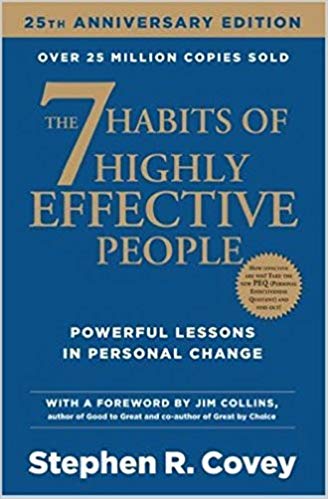

This article is an excerpt from the Shortform summary of "The 7 Habits of Highly Effective People" by Stephen Covey. Shortform has the world's best summaries of books you should be reading.
Like this article? Sign up for a free trial here .
As life constantly changes, how do you keep your focus on your values and goals? How do you make sure every small action you make is moving you closer to your destination?
You can create a personal mission statement. A 7 Habits mission statement is a document you create that identifies the big picture — the life you want to lead, the character traits you want to embody, the impact you want to have on those around you.
This document serves as a reminder of your ultimate goals and helps you ensure each short-term pursuit and daily action is in line with what’s most important to you.
Editor’s note: This article is part of Shortform’s guide to habits. If you like what you read here, there’s plenty more to check out in the guide!
What Is a Personal Mission Statement?
Wondering how to create a personal mission statement? Your 7 habits mission statement should focus on three things:
- Character: Who do you want to be?
- Contribution: What do you want to do?
- Achievements: What are the core values and principles that govern your character and contributions?
Think of it like the U.S. Constitution: Your 7 Habits mission statement is the standard by which everything is measured and directed. Except for a handful of amendments, the Constitution has been virtually unchanged for more than two centuries, despite dramatic environmental, social, cultural, industrial, and political changes. The Constitution is so stable because it’s based on such basic, timeless principles that its essence has been applicable across centuries in very different environments.
If you create a 7 Habits mission statement that centers around your values at the core of who you are and who you want to be, it will guide you through the many phases and changes in your life. In fact, crystallizing the changeless core of who you are actually helps you adapt to change, because it reinforces such a secure sense of self that you won’t be threatened by changes around you.
Developing Your Personal Mission Statement According to the 7 Habits
When you sit down and think about how to create a 7 Habits mission statement, start by looking at the most basic paradigms that dictate how you see the world. As you examine these paradigms, they’ll reveal your innermost values and principles. Stephen Covey’s mission statements are meant to reflect these paradigms.
Each person’s 7 Habits mission statement will be distinct because everyone is unique and has individual experiences; rather than inventing your mission or emulating someone else’s, try to find your mission through self-examination, reflection, and honest assessment of your unique strengths and values.
The process of writing your 7 Habits mission statement requires deep introspection and careful thought. Allow ample time for this — it may take weeks or months to take an honest and thorough look at your paradigms and driving forces. The process itself is just as important as the final result, because it makes you think through how you want to live your life and what actions reinforce that.
As you develop your 7 Habits mission statement, it helps to identify the many roles you have — spouse, son/daughter, brother/sister, father/mother, friend, professional, individual — and create goals for each role. If you don’t parse out your vision and goals to address each of your roles, it’s easy to focus your mission statement too heavily on one area of your life and neglect others; you may accidentally make a mission statement too centered on work accomplishments and lose the balance in your goals that reflects a balanced life.
Effective goals should focus on the end result you want, your destination, rather than the route to get there. Once you’ve identified your destination, then you can figure out a path to reach it — and your personal mission statement will help you know when you’ve arrived — but you must begin with the end in mind.
Identifying Your Center: Step 1 in Your 7 Habits Personal Mission Statement
Creating your personal mission statement requires a process of deep reflection and self-evaluation as you examine your paradigms and discover the values that guide your decisions and actions.
Your paradigms determine four essential aspects of your life:
- Security: Your identity and self-worth, which grounds you and gives you strength.
- Guidance: The source of your direction in life, the factors that are influencing your choices and actions.
- Wisdom: How well you understand how different life principles interrelate and how you interpret how life works.
- Power: Your strength and capacity to act, including — and especially — when it entails being proactive and rewriting your habits.
Each of these factors falls on a continuum; it isn’t a matter of whether or not you have them, but where you fall on the spectrum. For instance, you could be highly insecure with a low self-worth and a shaky sense of identity, or you could have high self-esteem and a firm sense of who you are.
These factors are also interdependent, collectively strengthening the others. If you have a strong sense of security and clear guidance, this heightens your wisdom, which helps you access your power.
Your core paradigms reveal your center; you can be centered on your marriage, friendships, family, work, money, possessions, pleasure, or, ideally, principles. Whatever is at your center determines your security, guidance, wisdom, and power. Knowing these things will help you form your 7 Habits mission statement.
Here’s a discussion of the most common centers, along with the problems they cause:
- If you’re marriage-centered, your sense of identity and self-worth is determined by the health of your relationship at that moment. Although marriage is an important relationship to nurture, making it your center creates emotional dependence. Your emotional security becomes subject to the natural ups and downs in the relationship and changes in your partner’s moods and behaviors, and anything in life that impacts your relationship or your spouse then threatens to shake your own security.
- If you’re family-centered, you derive your security from the strength of your family traditions and reputation. Again, this makes your self-worth vulnerable to other people’s actions and external forces that are out of your control.
- Surprisingly, being friend- or enemy-centered is largely the same; in both contexts, your interactions with other people, their opinions of you, and their treatment of you determine your sense of self-worth. Your guiding force is how you think others will respond to your decisions, and you have no individual power because other people are determining your actions.
- If you’re money-centered, your self-worth changes with the rise and fall of your net worth. You’re inclined to be anxious and protective of your money as the source of your identity, and any outside factors that could impact your money become a threat.
- If you’re work-centered, you base your identity in your profession and your position at work; work-centered people are likely to be “workaholics” who sacrifice their relationships, health, and hobbies in the name of work. Their wisdom and power are confined to the context of their jobs, so they become powerless in other areas of their lives.
- If you’re possession-centered, your focus and self-worth are tied up in material possessions (e.g. cars, homes, and nice clothes) or intangible possessions (e.g. social status, authority, and recognition). Not only does your self-worth depend on maintaining these possessions, but it also rises and falls depending on whether you’re around someone who has more than you, making you feel inferior, or less than you, making you feel superior.
- If you’re pleasure-centered, your main priority is on having fun and maximizing your pleasure in life, to the neglect of work, relationships, and self-discipline. You are quickly bored and become narcissistic in your constant pursuit of how life can provide you the most pleasure. Your security, guidance, wisdom, and power exist only in brief moments of pleasure.
- Being church-centered is distinct from being spiritually or religiously centered. Whereas being spiritually centered can guide you through inner examination and discovery, being church centered emphasizes the appearance of being involved in the community, meeting social standards, and clearly displaying your membership in the group. You’re guided by social conscience rather than religious principles, and threatened by anything that jeopardizes your image or membership in the church.
- If you’re self-centered, you’re driven more by selfishness than by an earnest attempt to develop and improve yourself. Many popular methods for self-fulfillment and personal growth are rooted in self-centeredness.
Many people have multiple centers; sometimes one takes precedence until it is momentarily satisfied (e.g. if you’re marriage-centered, your relationship with your spouse is in a happy place), and then another focus rises as the primary center for a period of time. For a consistent, reliable source of security, guidance, wisdom, and power, it’s best to have one center; this creates a clear focus of your values and priorities.
All of the centers above seem to have issues. So what’s the ideal center to have? Covey argues it’s a center based around your principles.
Unlike the centers described above, a principle-centered life does not subject your identity, perspective, and power to uncontrollable external forces; principles are timeless and unchanging, superseding people and circumstances. Stephen Covey says a mission statement involves paradigms that are created around these indisputable principles help you to see the world more accurately, as opposed to money-centered, pleasure-centered, or other paradigms that distort your lens.
Granted, you may have limited awareness and understanding of certain principles until you have a life experience that illustrates that principle, and be unable to follow Stephen Covey’s missions statement advice. For example, you might not understand the importance of human dignity until you see someone being treated without dignity. As you move through life and gain experiences and knowledge that expand your understanding of fundamental principles, you’ll be better able to incorporate them into your paradigms, and learn how to create a personal mission statement.
Group Mission Statements
7 Habits mission statements are also effective for groups — whether families, organizations, or businesses. Group mission statements help everyone in the group remain on the same page about the group’s values and goals, and create a sense of unity and investment in the well-being of the group.
As with personal mission statements, the process of developing, writing, and fine-tuning a mission statement is as important as the finished product, so it’s critical that everyone in the group be involved in creating the mission statement. This process gets all the group members thinking and talking about what matters to them, and what they believe the group’s priorities should be.
If group leaders write a 7 Habits mission statement without input from everyone else, the group members will be much less invested than if they’d contributed to the process; even if they agree with it initially, their commitment is likely to wane with time and in trying situations. On the other hand, if everyone is involved with creating the mission statement, they’re more likely to feel that it reflects their own values and to work harder to uphold it.
Developing your personal mission statement is an important part of tackling the 7 Habits of Highly Effective People. With your 7 Habits personal mission statement, you’ll be able to see clearly who you are and what you want to achieve, which will allow for further self-improvement and awareness.
———End of Preview———

Like what you just read? Read the rest of the world's best summary of "The 7 Habits of Highly Effective People" at Shortform . Learn the book's critical concepts in 20 minutes or less .
Here's what you'll find in our full The 7 Habits of Highly Effective People summary :
- How to prioritize the hundred tasks you have to focus on the one or two that really matter
- The right way to resolve every disagreement and argument
- How to avoid burning out and succeed over 20+ years







I was just beating around the bush, since I read this article, my life has never been the same.thanks to guys